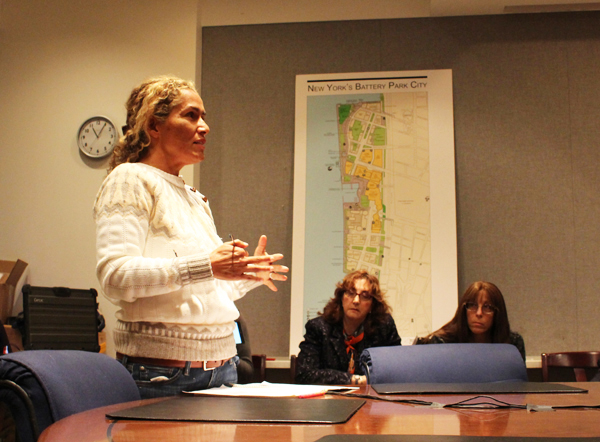
The first member of the public ever allowed to comment at a BPCA board meeting, a Cove Club resident who identified herself as “Jeanette,” got into an argument with chairman Dennis Mehiel over the strict two-minute time limit. Seated are the other two residents who spoke at the Dec. 7 meeting, Tammy Meltzer, at right, and Justine Cucca.
BY BILL EGBERT
It was called “an experiment,” and though no test tubes exploded, the first-ever public comment session at the Battery Park City Authority’s December board meeting did cause some sparks to fly.
Residents and elected officials had lobbied for months to convince the BPCA to allow public comment at board meetings — as do many similar state and city authorities — and pushed back against the board’s compromise measure to allow only elected officials to speak during meetings. The BPCA finally relented in a surprise move at its October meeting, voting unanimously to allow members of the public to speak for two minutes each, provided they register for time ahead of the meeting.
Only six people had signed up to speak, at the Dec. 7 meeting, and of them only three were actually able to show up — a problem that one of the registered speakers, Community Board 1 member Tammy Meltzer, predicted for meetings scheduled during the workday.
“BPCA meetings are very difficult for most residents to get to,” she said before the board convened last week, adding that allowing public comments should help the BPCA more responsive to residents, but only part of the solution to the Albany-appointed board’s notorious detachment. “This is an important step, but it’s only part of what’s needed.”
The invitation for public comment may not have prompted a mob of villagers with torches, it didn’t take long for tempers to flare when the limits of the BPCA’s concession were felt.
The first member of the public ever allowed to speak at a BPCA board meeting was a Cove Club resident who gave her name only as “Jeanette” (but was later identified by the Broadsheet as Jeanette Wyman) and objected to the plan to pave the cul-de-sac at the end of South End Ave. to make a pedestrian plaza that she feared would only serve to draw tourists.
She said at the outset that she had four topics she wanted to address, but was barely through her comment on the cul-de-sac when she hit the two-minute limit. BPCA board chairman Dennis Mehiel invited her to add her written comments to the record, but having made time to attend the 10 a.m. meeting, Jeanette wanted to press on.
“If I could be allowed a couple more minutes out of respect,” she said.
“Whatever your allocated time is you’re welcome to use it as you see fit,” replied Mehiel before confirming with the timekeeper that her two minutes were up.
“Do you think that two minutes is even appropriate?” asked Jeanette.
“We put a protocol in place,” said Mehiel. “We have to stay with the protocol.”
Jeanette pushed back, asking that the time limit be extended on the grounds that two minutes wasn’t long enough for her to brief the board on all her concerns, but Mehiel was resolute.
“What we don’t want to do is change this public comment protocol,” he said. “This is an experiment. We’re trying it out, and I think it’s important that we stay with the protocol.”
“So then for the future, maybe you should extend it to five minutes out of respect for the people who actually pay to run this town,” said Jeanette, sounding thoroughly exasperated.
“This is the first public comment, and the first meeting, and we’re in a debate about the protocol,” replied Mehiel. “We ask you to please abide by the two-minute limit.”
“Okay, fine. That’s rude. Two minutes is not enough,” said Jeanette as she yielded the floor.
The other two speakers clearly rushed through their tightly prepared remarks, and even they ran out of time.
Meltzer praised the authority’s bike-safety working group, which recently convened to define new bicycle policies for the Esplanade, and suggested that should be a model for getting residents involved at the start of the BPCA’s decision processes on a range of issues, such as the Wagner Park renovation and the controversial plans to remake South End Ave. She also encouraged the board to turn to CB1 for information and feedback on such projects before spending money on outside consultants and surveys.
Justine Cucca, a public member of the CB1 Battery Park City Committee, echoed Meltzer request to involve residents in more working groups, but she also asked board members to encourage Gov. Cuomo, who appoints the BPCA board, to tap residents to fill the two open seats on the board, which currently includes only one person who actually lives in BPC, Martha Gallo.
“There is no shortage of qualified people living here,” she said.
Cucca also implored the board to extend the ground lease past its current end in 2069, and roll back ground rents to preserve BPC as “a middle class residential district.”
The entire public comment “experiment” took just a few minutes at the end of an hour-long meeting, and Jeanette’s joust with Mehiel about the protocol lasted longer than her two-minute comment.
According to the scientific method, of course, Mehiel was correct to emphasize that one must strictly adhere to rigid protocols laid out beforehand for a controlled experiment to produce valid results. But scientists conduct experiments with the aim of proving a hypothesis, and it’s not clear what hypothesis Mehiel was trying to prove.
If the aim was to show that allowing public comment would cause more strife than it would resolve, the experiment might be considered a success.
But any attempt by the BPCA board to put the public comment genie back in the bottle would surely meet fierce backlash from both residents and electeds.
Borough President Gale Brewer, who had lobbied the board to allow public comment, attended the meeting to witness the historic first session. Though she didn’t request time for herself, and when Mehiel invited her to speak anyway, Brewer applauded the board for inviting residents to speak, but took him to task for his apparently tentative embrace of the new policy.
“Thank you for doing this, and I hope you continue. It’s not an experiment,” she said. “It’s a good thing.”

























